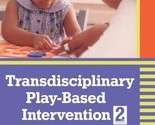Early childhood professionals: the new ""Transdisciplinary Play-Based System"" is here, and it's better than ever! For 15 years, this highly acclaimed linked system has been one of the most natural, easy-to-use assessment and intervention approaches for children birth to age six - and now it's been completely revised and updated so it's even more effective and user-friendly.Why choose ""TPBA2"" and ""TPBI2""? This popular system gets accurate assessment results and improves child outcomes because it's: play-based, so children are relaxed, engaged, and motivated enough to show the full range of their skills and abilities; child-directed, so it encourages spontaneity and creativity and is easy to use in home-based settings; strengths-focused, assessing what children can do instead of what they can't; and, parent-friendly, tapping into the invaluable expertise of those who know the child best.Current ""TBPA/I"" users will find the basics unchanged.Professionals start with ""TPBA2"", a comprehensive, easy-to-follow guide to assessment with in-depth child development information. While the child engages in natural play with a parent, professionals use the practical guidelines and useful developmental information to assess 4 domains - sensorimotor, emotional and social, communication and language, and cognition - and gather qualitative information about what the child can do.Then, with ""TBPI2"", professionals partner with parents to choose customized play-based interventions that help children make progress across domains and generalize their new skills in different situations and settings.All forms needed to execute ""TPBA2"" and ""TPBI2"" are included in the manuals and are photocopiable. For ease of use, the forms are also sold separately. Paper forms come in a gummed tablet that includes one each of the 7 essential forms needed for assessment and intervention (one tablet per child)., SAVE when you order the complete TBPA/I2 3-volume set. Create customized play-based interventions that help children make real progress across four domains--sensorimotor, emotional and social, communication, and cognitive. With Transdisciplinary Play-Based Intervention, Second Edition (TPBI2) , early childhood professionals will learn how to address global outcomes as well as specific functional processes and behaviors as targets for intervention scaffold intervention with a continuum of approaches, ranging from adult-directed to child-directed support caregivers and children in learning strategies and skills to use throughout the day in natural environments encourage generalization of skills across contexts and environments evaluate child progress The thoroughly updated second edition of TPBI2 features Strong foundation in DEC and NAEYC guidelines OSEP child outcomes crosswalk Expanded content on critical topics such as literacy, vision, hearing, and daily living skills Explicit links between assessment and intervention With TPBI2, professionals will find it even easier to conduct effective, practical interventions that really improve young children's outcomes. Learn more about the TPBA and TPBI system. Watch a recorded webcast on the TPBA/I system See how this product helps strengthen Head Start program quality and school readiness., SAVE when you order the complete TBPA/I2 3-volume set, with and without the forms CD. Create customized play-based interventions that help children make real progress across four domains--sensorimotor, emotional and social, communication, and cognitive. With Transdisciplinary Play-Based Intervention, Second Edition (TPBI2) , early childhood professionals will learn how to address global outcomes as well as specific functional processes and behaviors as targets for intervention scaffold intervention with a continuum of approaches, ranging from adult-directed to child-directed support caregivers and children in learning strategies and skills to use throughout the day in natural environments encourage generalization of skills across contexts and environments evaluate child progress The thoroughly updated second edition of TPBI2 features Strong foundation in DEC and NAEYC guidelines OSEP child outcomes crosswalk Expanded content on critical topics such as literacy, vision, hearing, and daily living skills Explicit links between assessment and intervention With TPBI2, professionals will find it even easier to conduct effective, practical interventions that really improve young children's outcomes. Learn more about the TPBA and TPBI system, and discover Toni Linder's play-based curriculum, Read, Play, and Learn!. Join us for free webinars on the TPBA/I system and other early childhood assessment tools, SAVE when you order the complete TBPA/I2 3-volume set, with and without the forms CD. Create customized play-based interventions that help children make real progress across four domains--sensorimotor, emotional and social, communication, and cognitive. With Transdisciplinary Play-Based Intervention, Second Edition (TPBI2) , early childhood professionals will learn how to address global outcomes as well as specific functional processes and behaviors as targets for intervention scaffold intervention with a continuum of approaches, ranging from adult-directed to child-directed support caregivers and children in learning strategies and skills to use throughout the day in natural environments encourage generalization of skills across contexts and environments evaluate child progress The thoroughly updated second edition of TPBI2 features Strong foundation in DEC and NAEYC guidelines OSEP child outcomes crosswalk Expanded content on critical topics such as literacy, vision, hearing, and daily living skills Explicit links between assessment and intervention With TPBI2, professionals will find it even easier to conduct effective, practical interventions that really improve young children's outcomes. Learn more about the TPBA and TPBI system, and discover Toni Linder's play-based curriculum, Read, Play, and Learn (R). Watch a recorded webcast on the TPBA/I system See how this product helps strengthen Head Start program quality and school readiness., An assessment and intervention approach for children birth to age six. While the child engages in natural play, professionals use the guidelines and developmental information to assess 4 domains - sensorimotor, emotional and social, communication and language, and cognition - and gather qualitative information about what the child can do.
